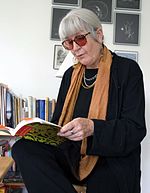Joanne Kyger, Date of Birth, Place of Birth, Date of Death
TweetJoanne Kyger
American poet
 Date of Birth: 19-Nov-1934
Date of Birth: 19-Nov-1934
 Place of Birth: Solano County, California, United States
Place of Birth: Solano County, California, United States
Date of Death: 22-Mar-2017
Profession: writer, poet, autobiographer
Nationality: United States
Zodiac Sign: Scorpio 
About Joanne Kyger
- Joanne Kyger (November 19, 1934 – March 22, 2017) was an American poet.
- The author of over 30 books of poetry and prose, Kyger was associated with the poets of the San Francisco Renaissance, the Beat Generation, Black Mountain, and the New York School. Although Kyger is often characterized as a prominent female Beat poet in the predominately male inner circle of Beat Generation writers, she never considered herself as belonging to the Beat movement.
- Nor did she formally identify with any other movement; her work invokes various schools of poetry without belonging to any of them.
- In Reconstructing the Beats, Amy L.
- Friedman calls Kyger “an important link between several major axes of American poetry and writing in the twentieth century.” Linda Russo, in the webzine Jacket’s edition devoted to Kyger, notes that “there is no one way to talk about her work except as that of a singular individual.”Kyger’s early poetry was influenced by Charles Olson’s “projective verse” concept of letting breath and open construction, rather than rhyme and syntax, guide poetic composition.
- This influence continued to shape her mature work.
- In a 2010 interview Kyger says, “You want to make it so that someone could say it.
- I try to ‘score’ the lines for the page with that in mind, the breathing, the timing.” Unlike Olson, notes Dale Smith in his essay "Joanne Kyger and the Narrative of Every Day," Kyger “focuses on events and happenings, moving herself out of the way as a kind of recording instrument .
- .
- .
- faithful to specific moments in time and attendant to the many spirits or moods of landscape.” In a 2007 review of Kyger’s book About Now: Collected Poems, Lewis MacAdams describes Kyger as from the “School of Backyard Poets, who look out their kitchen windows and see the universe.”Kyger's poems emerged from a daily literary practice of recording thoughts, events, and dreams.
- Most of the poems are dated, either in the title or at the end.
- Much like journals, they include everything from philosophical musings to the weather.
- Themes—arising from her practice of Zen Buddhism, study of consciousness, explorations of ancient Greek and Native American mythologies, frequent travels to Mexico, observations of the natural landscape, and daily life in a small coastal town—continue from book to book, like installments in an autobiography.
- In a 2011 interview, Kyger says, “I think of notebook writing like a practice—I try and do it whether I have anything good or bad or interesting to say.
- And the chronology becomes the narrative, a history of a writing ‘self.’”
Read more at Wikipedia
See Also
- Famous People's Birthdays on 19 November, United States
- Famous People's Birthdays in November, United States
- Famous writer's Birthdays on 19 November, United States
- Famous writer's Birthdays in November, United States
- Famous poet's Birthdays on 19 November, United States
- Famous poet's Birthdays in November, United States
- Famous autobiographer's Birthdays on 19 November, United States
- Famous autobiographer's Birthdays in November, United States

